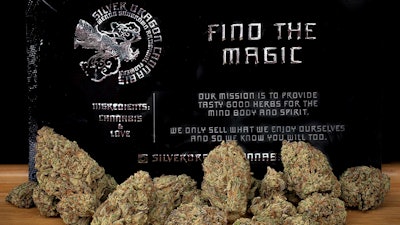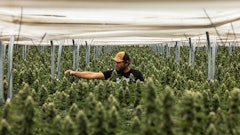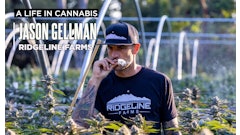
David Silverstone, founder of Silver Dragon Cannabis, an off-grid, biodynamic cannabis farm in Mendocino County, Calif., has been supplying patients in the state’s medical market since 2008.
Silverstone’s flower took the top award for cannabis grown from seed in the 2016 Emerald Cup, and he says his genetics are what has kept him successful as he’s transitioned to California’s adult-use cannabis market.
Silverstone entered Mendo Crumble—a strain that he did not create, but has taken an interest in—into the inaugural California State Fair Cannabis Awards last year and took home gold medals in the pinene category among both Outdoor growers and the Best in California field. Mendo Crumble’s pinene content clocked in at 4.3%.
Each of the more than 300 submissions to the contest were tested by SC Labs, and medals were awarded based on overall terpene or cannabinoid expression in one of ten total categories.
“It’s all just lab-based, so that makes it an even playing field for everybody involved,” Silverstone says of the awards.
Here, Silverstone shares more about Mendo Crumble, his first impressions of the 2022 California State Fair Cannabis Awards and his submission to this year’s competition.
Melissa Schiller: Can you tell me a bit about Mendo Crumble? What are some of its most interesting attributes?
David Silverstone: The high terps are the most interesting attribute of it, really. My sample, my entry, was at 4.3%, which was grown outdoors.
MS: Did you set out to grow a pinene-dominant strain? What drew you to this terpene or this particular cultivar?
DS: A lot of strains are pinene dominant. Pinene is one of the most common terpenes in cannabis strains. Myrcene and pinene are two of the most common, and pinene is [found in] more of the sativa-type strains. The more indica-dominant strains are leaning more toward the myrcene.
MS: What was your impression of the California State Fair Cannabis Awards in general?
DS: It was the inaugural year, the first ever in California history for California to recognize cannabis as an agricultural endeavor. All of the results are recorded in the almanac, in a history book, so it’s now made history. We’ve made history as the first ever, so that’s a cool thing. That’s pretty neat that my brand and my farm got recognized as the best in the state in the history books now, in the almanac. Regardless of what happens, at least I can retire or I can go on to something else knowing I was at least successful on one level.
MS: In terms of the California cannabis market in 2023, what is one thing you’d like to see change?
DS: The only thing that would change the trajectory of this path we’re on is for legislation to take place that would allow cannabis to be treated like an agricultural product, that would allow it to be treated like any other flower or fruit. If farmers could sell directly to the public, if we could have farmers markets and have booths at farmers markets and there not be so many hoops and regulations to jump through, if we could have direct-to-consumer sales, if you, as a consumer, could go to a farmer’s website and order an ounce of flower from a farmer and they’re allowed to mail it to you, that would be the only thing that might start changing things and make it a little bit more balanced.
MS: Are you planning to enter the state fair competition this year? If so, can you tell us a bit about what you’ve been working on?
DS: We already entered our flowers a month or two ago. This time, I’m entering the heirloom strains that are my genetics, that are the genetics of this farm. That Mendo Crumble, I didn’t create that. So, this year, I’m entering only my proprietary strains that I was involved in creating and that I’m the keeper of, that I’m the only one who has those varieties. I’m keeping it more personal this year.
Editor's note: This interview has been edited for style, length and clarity.
Join us this year at the Paris Las Vegas Hotel & Casino for Cannabis Conference, the leading education and expo event for plant-touching businesses.
























